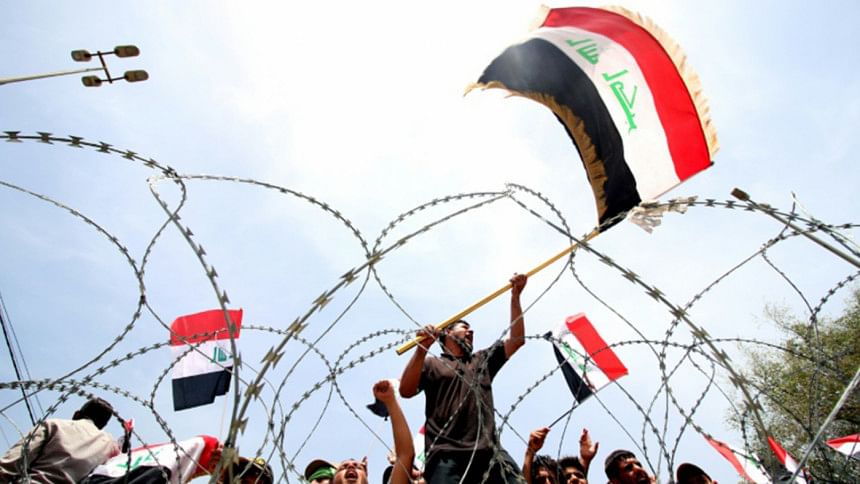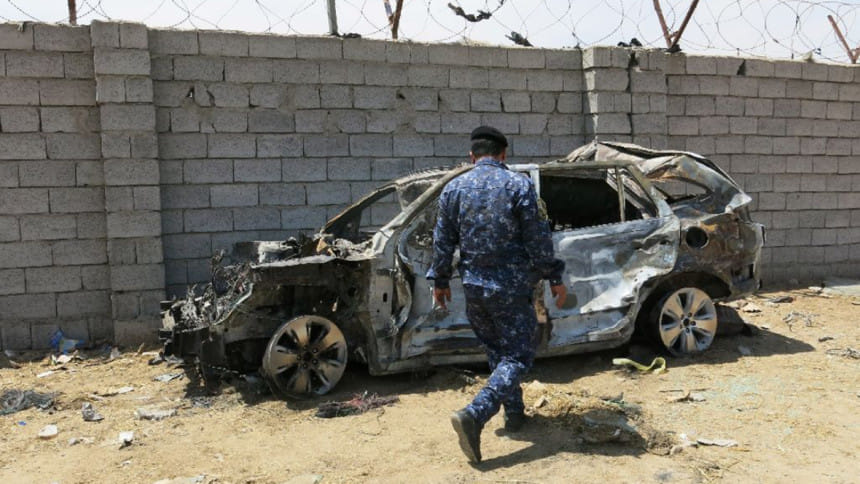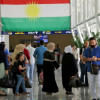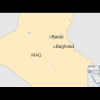Thousands of protesters storm Baghdad 'Green Zone', parliament

Thousands of angry protesters broke into Baghdad's heavily fortified "Green Zone" and stormed the parliament building after lawmakers again failed to approve new ministers.
It is the climax of weeks of political turmoil in Iraq that has seen MPs hold a sit-in, brawl in the parliament chamber and seek to sack the speaker, stalling Prime Minister Haider al-Abadi's efforts to replace party-affiliated ministers with technocrats.
The Baghdad unrest came after a bombing targeted Shiite pilgrims near the Iraqi capital earlier in the day, killing at least 23 people.
The Green Zone is the most secure part of Baghdad, housing the parliament, the prime minister's office and embassies including those of the United States and Britain.
"You are not staying here! This is your last day in the Green Zone," shouted one protester as thousands broke into the central Baghdad area.
Protesters attached cables to the tops of heavy concrete blast walls that surround the Green Zone, pulling them down to create an opening, television footage showed.
They then headed to parliament, where some rioters rampaged through the building and broke into offices, while other protesters shouted "peacefully, peacefully" and tried to contain the destruction, an AFP reporter at the scene said.
Security forces were present but did not try to prevent the demonstrators from entering the parliament building, the reporter said.
Protesters pulled barbed wire across a road leading to one of the exits of the Green Zone, effectively preventing some scared lawmakers from fleeing the chaos.
Protesters attacked and damaged several vehicles they believed belonged to lawmakers.
Parliament failed to reach a quorum on Saturday after approving some of Abadi's ministerial nominees earlier in the week.
The Green Zone unrest kicked off minutes after powerful cleric Moqtada al-Sadr wrapped a news conference in the holy Shiite city of Najaf during which he condemned the political deadlock.
Last month he had threatened that his supporters would storm the Green Zone, but he did not order them to enter the area in his Saturday address.
Bombing kills 23
The politicians "refused to end corruption and refused to end quotas", Sadr said, adding that he and his supporters would not participate in "any political process in which there are any type... of political party quotas."
Key government posts have for years been shared out based on political and sectarian quotas, a practise demonstrators want to end.

Abadi's move to change the system has been opposed by powerful political parties that rely on control of ministries for patronage and funds.
Both Washington and the United Nations have warned that the political crisis could distract from the fight against the Islamic State (IS) jihadist group.
The car bomb that exploded in the Nahrawan area near Baghdad killed at least 23 people and wounded at least 38 others, security and medical officials said.
It struck a road used by Shiite pilgrims who were walking to the shrine of Imam Musa Kadhim in northern Baghdad for annual commemorations, officials said.
IS, which considers Shiites to be heretics, claimed the attack and said it was carried out by a suicide bomber who detonated a vehicle laden with three tonnes of explosives.
Kadhim, the seventh of 12 imams revered in Shiite Islam, died in 799 AD. The pilgrimage has in recent years turned into a huge event that brings the Iraqi capital to a standstill for days.
Last year's pilgrimage was also marred by attacks against worshippers that killed at least 13 people.
And four more were burned or shot to death when mobs torched houses and a Sunni religious endowment building after rumours of a suicide bomber sparked panic among a crowd of pilgrims.
Iraqi forces backed by US-led military assistance have regained significant ground from IS, which overran large areas north and west of Baghdad in 2014.
But the jihadists still control a large part of western Iraq, and are able to carry out frequent attacks against both civilians and security forces in government-held areas.

 For all latest news, follow The Daily Star's Google News channel.
For all latest news, follow The Daily Star's Google News channel. 








Comments